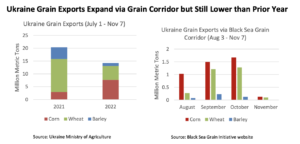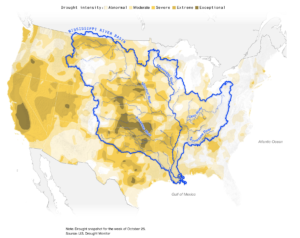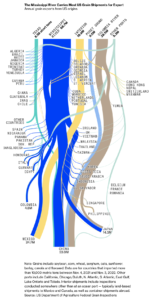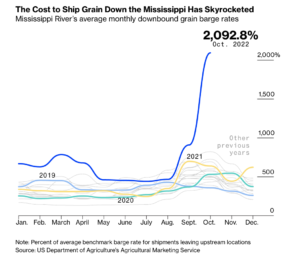As a result of the attack on Iran, nitrogen fertilizer at the port of New Orleans has seen an increase in price this week. Urea prices for barges in New…
UN, Russia to Discuss Black Sea Export Deal, Mexican GM Corn Purchases an Issue, as Mississippi River Water Levels Highlighted
Reuters writer Michelle Nichols reported yesterday that, “Top U.N. officials will meet a senior Russian delegation in Geneva on Friday to discuss extending a Ukraine Black Sea grain export deal and efforts to smooth shipments of Russian food and fertilizers to global markets, the United Nations said.
“The deal allowing the export of food and fertilizers from several of Ukraine’s Black Sea ports – brokered by the United Nations and Turkey on July 22 – could expire on Nov. 19 if Russia or Ukraine object to its extension.”
Nichols added that, “A key part of the July package deal is also facilitating exports of Russian grain and fertilizer exports. The United Nations has said that Russian grain exports have increased, but that work needed to be done to alleviate a chilling effect of Western sanctions on Russian fertilizer exports.”

Today, Reuters News reported that, “Russia said on Wednesday it still saw no progress on easing its exports of fertilisers and grain – parts of the Black Sea grain deal that Moscow views as fundamental to extending the initiative beyond next week.
“Foreign Ministry spokeswoman Maria Zakharova told reporters the United States and European Union were obstructing Russia’s exports and said it remained unclear whether Moscow would extend its participation in the initiative, which expires on Nov. 19.”
Elsewhere, Reuters News reported yesterday that, “Mexico’s government cannot make purchases of yellow corn from the United States because it does not want genetically modified (GM) corn, President Andres Manuel Lopez Obrador said on Wednesday, amid pressure from its top trade partner over the future of the imports.
“The United States wanted to sell Mexico more yellow corn and Mexico declined, Lopez Obrador said in a regular news conference.
“‘There is a market for it, but the government cannot make a purchase because we do not want GM,’ Lopez Obrador said, citing a lack of scientific investigation into its effects.”
Yesterday’s article pointed out that, “Mexico has a controversial presidential decree that seeks to ban genetically modified corn in 2024 and phase out the herbicide glyphosate, found in Roundup.
“Like most countries, the overwhelming amount of corn purchases in Mexico are made by private companies, including major commodities traders like Cargill (CARGIL.UL) and Bunge.”
The Reuters article added that, “Mexico is ready to halve its U.S. imports of yellow corn when the decree goes into effect and is considering direct agreements with farmers to secure non-GM yellow corn imports, the country’s deputy agriculture minister said in October.”
Earlier this week, Wall Street Journal columnist Mary Anastasia O’Grady stated that, “In his interview with RFD-TV, [Agriculture Secretary Tom Vilsack] said he hopes Mexico will recognize that under the USMCA ‘they have a responsibility to respect the science.’ Failing that, the U.S. and Canada are likely to take the matter to an arbitration panel. If Mexico loses, its trading partners will have the right to retaliate by imposing new tariffs on Mexican exports.
“Trade policy is said to produce winners and losers. But if [Mexican President Andrés Manuel López Obrador] prevails in this case, almost everyone will be a loser.”
Meanwhile, Bloomberg’s David R. Baker, Kim Chipman, Brian K. Sullivan, Kyle Kim and Chloe Whiteaker indicated yesterday that, “The Mississippi River — the immense, quiet highway that courses down the middle of America, moving critical food, wood, coal and steel supplies to global markets — is shrinking from drought, forcing traffic to a crawl at the worst possible time.

“With water levels at record lows, barges have run aground, causing traffic jams as boats wait for the US Army Corps of Engineers to dredge a path through the shallows. The problem has been building for months. Summer brought meager rain to much of the Plains and Midwest.

“Now it’s harvest time, when farmers bring in their grains and other crops, send them to market, and lay down fertilizer before the winter snows. The shriveled Mississippi has forced them to seek alternatives, all of them more expensive, like moving soybeans by rail to the Gulf Coast or shipping everything through distant West Coast ports. That will inevitably increase pressure on global food prices at a time when Russia’s invasion of Ukraine has already sent them soaring.”

The Bloomberg article noted that, “All told, the economic hit from the river’s historically low levels could reach $20 billion, according to AccuWeather.”
“The normal flow of fertilizers north on the river has also been blocked, crimping supplies and driving up costs for farmers. Soon, the Mississippi’s northernmost stretches will freeze for winter,” the Bloomberg article said.
(1 of 7) JUST IN: Drought & abnormal dryness expanded to a record extent across the contiguous U.S.
— NOAA (@NOAA) November 8, 2022
Mississippi River recorded its lowest water levels in a decade.
More from the #October #StateOfClimate Report: https://t.co/nzLRg5jB5T@NOAANCEI pic.twitter.com/SjXreUZTcW
Yesterday’s Bloomberg article added that, “‘When you start looking at the higher cost of fertilizer, the higher cost of seeds, the higher cost of fuel right now, it just compounds,’ said [Kenneth ‘Kenny’ Hartman, a southern Illinois grower], who has been farming since the early 1980s. ‘The profit isn’t what everybody thinks it is — and then the river situation just adds to that.'”





